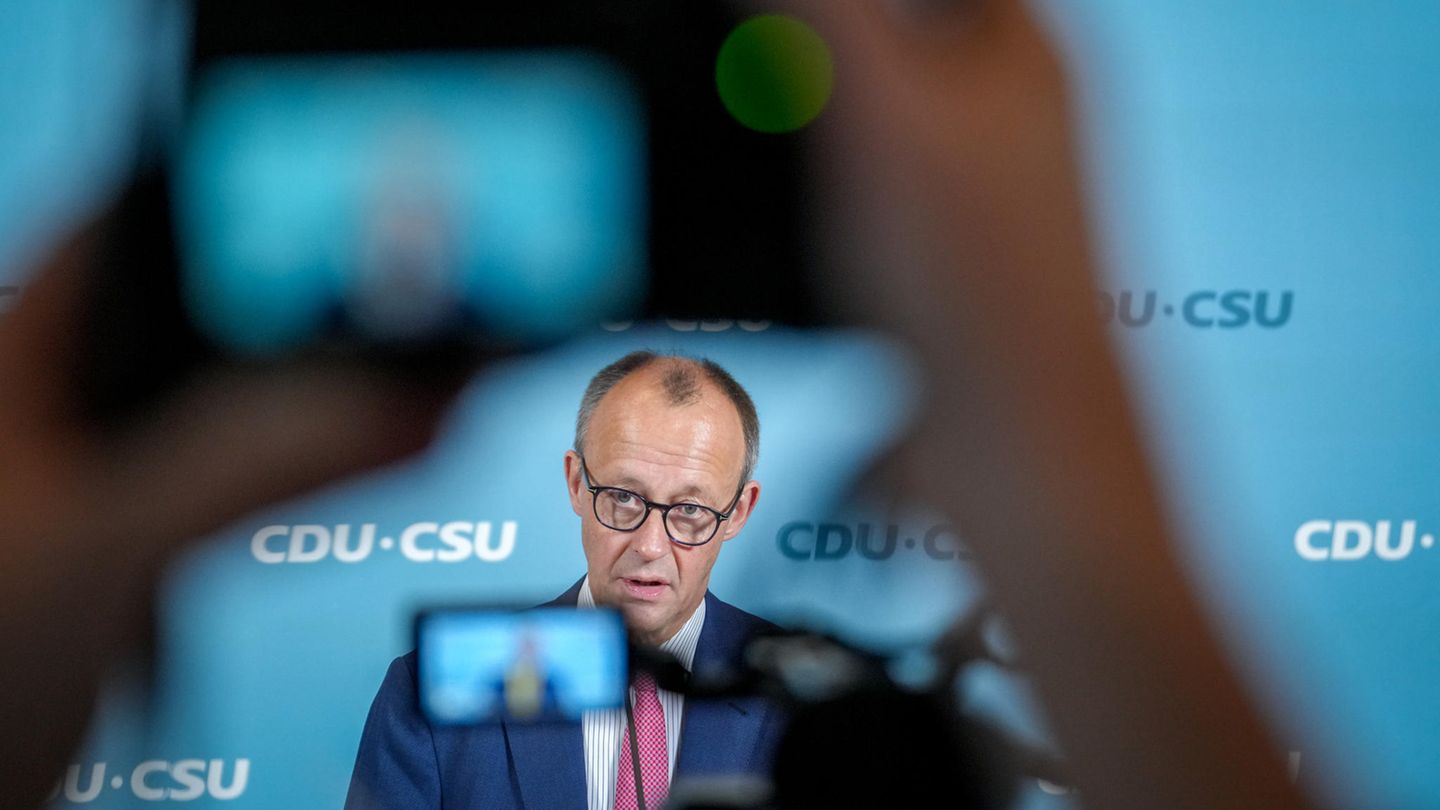disinformation
100 women against Merz? How fake news threatens the election campaign
Copy the current link
Fake news about fake news? An online medium reports on an alleged smear campaign by the SPD against Friedrich Merz. The party denies it and the media deletes the article.
Videos on TikTok about Friedrich Merz have caused a stir online. An online article from a major news portal reported on an alleged election campaign by the SPD against the CDU chairman and presumed candidate for chancellor. Anger and indignation in the Christian Democrats camp, anger and denials among the Social Democrats. Because in retrospect it turns out: There is no campaign at all. The case shows how confusing the situation in the fight against disinformation can sometimes be.
What happened?
On Saturday evening, an article appeared on “Focus Online” in which it was claimed that the SPD was planning to have 100 women synchronously post videos in which they expressed their fear of a possible chancellor Friedrich Merz. Union insiders were named as sources. The SPD vehemently rejected the allegations of a planned smear campaign against Merz. Raphael Brinkert, head of the SPD election campaign agency “brinkertlück”, wrote on
In fact, there were a number of videos on the social media platform TikTok in which women expressed fears about a possible Chancellor Merz. Some of these videos received hundreds of thousands of views and tens of thousands of likes. In these videos, they talked about, among other things, “why this man is unelectable for young women.”
“Focus Online” deleted the controversial article after a few hours without any further comment. This led to widespread criticism on social networks. It was only on Monday morning that “Focus Online” published a statement about the deletion of the article. It states that initially reliable sources reported a targeted campaign. However, further research and the parties’ reactions have led to a new assessment: “We no longer assume that there were strategic considerations by the SPD in the way we originally described.”
In another statement on Tuesday afternoon, the “Focus Online” editorial team apologized to its readers and the SPD. “Especially in times of manipulated news, as we saw in the US election campaign, journalistic care becomes even more important. We are additionally sensitized to this in our future reporting.”
Fairness agreements and legal steps
The SPD is nevertheless taking legal action against the online medium. The SPD General Secretary Matthias Miersch criticized the reaction of “Focus Online”: “Focus Online fails to mention that the editorial team only gave in after we called in the media lawyer Christian Schertz due to the initial suspicion of defamation.” He described the article as “disinformation, hatred and incitement.” It is based on untested claims from alleged CDU insiders – the SPD has not been confronted with the allegations. “This has no journalistic basis,” said Miersch.
Miersch then offered all democratic parties a “fairness agreement”. This includes checking sources and not using false reporting as a basis for election campaigns. He also wants to agree on a common approach to AI content and deepfakes.
Campaign or trend – difficult to distinguish
On TikTok, accounts close to the AfD also jumped on the trend of discussing concerns about a Chancellor Friedrich Merz – but with a different spin. They posted quotes from Tino Chrupalla like “Whoever votes for Merz, chooses war” or wrote in the video description: “Friedrich Merz and the CDU are a danger for Germany.”
Is this a campaign against the CDU leader? “It may be that such a trend grows organically,” says Andre Wolf, communication expert and spokesman for the “Mimikama” association, which campaigns against internet abuse. “One person starts, encourages others, then they join in. Or there is an orchestrated campaign. Unfortunately, we don’t know that.” Distinguishing between organic and organized trends is often difficult.
The motives for organized trends are clear: “The goal of disinformation campaigns is not to convince anyone. The goal is rather to destroy trust. People should no longer know who to believe. They should believe that everyone is lying. “
Wolf says that people in Germany are not yet used to such campaigns. “They’re much stronger abroad. Campaigns like this have been going on in the US for years.” Coordinated action on social media during election campaigns is also known in neighboring EU countries. “Even here in Austria we know that social media campaigns are running in the background in which people are manipulated and specifically encouraged to take part in certain trends.”
SPD advertiser Raphael Brinkert warns in an interview with star: “Regardless of this specific case, we all have great respect for this election campaign.” It’s not just democratic competition: “Third parties also have an interest in destabilizing democracy in Germany.”
Brinkert therefore urges caution against jumping to conclusions too quickly: “Unfortunately, in times like these, especially with campaigns on social networks, you always have to be careful. You don’t know: Is this coming from the direct democratic competitor? Is it simply coming from normal users of social media? Or does it come from a third party?” What he means: “Are they possibly attacks on our people and our country?” Russia, for example, would have a vital interest in attacking democracy in Germany.
There are three exciting months ahead for election campaigns from all parties. How fair it is is no longer solely in their hands.
Source: Stern
I have been working in the news industry for over 6 years, first as a reporter and now as an editor. I have covered politics extensively, and my work has appeared in major newspapers and online news outlets around the world. In addition to my writing, I also contribute regularly to 24 Hours World.





